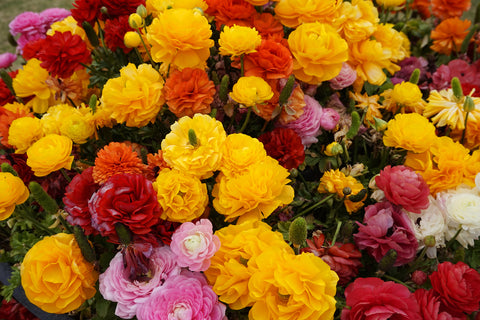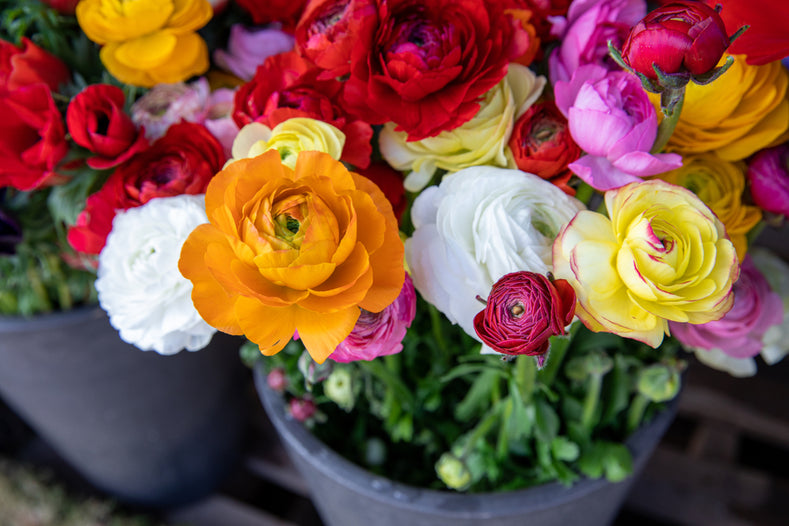Ranunculus boast beautiful, bright colored flowers with ruffled petals on straight stems. Ranunculus flowers are true showstoppers and are perfect flowers to grow in the garden in beds, borders and containers. Be sure not to forget to make the most of these fabulous blooms as fresh cut flowers for summer bouquet arrangements.
When it comes to growing these excellent flowers, here is everything you need to know!
What are Ranunculus?
The Ranunculus is a genus made up of almost 600 species of flowers that belong to the Ranunculaceae family. The flowers are commonly referred to as buttercups, spearworts or water crowfoots. Ranunculus are easy to identify with their luscious layers of petals and texture.
The most popular colors include red, pink, yellow, gold, white and orange. Ranunculus can grow up to 20” inches high and 6-12” inches wide. The long stems make this plant fantastic for cutting for use as vase flowers where they can last over a week!

When to Plant Ranunculus
Ranunculus are commonly planted in the Spring for blooms in the summer. Ranunculus adore full sunshine and warm climates, making them hardy in zones 8-10 and suitable 4-7.
Where to Plant
In warmer climates, you can plant the bulbs straight into the soil but if you are in a colder environment, it may be best to start the growing process indoors. Plant the bulbs in a sunny spot with good-drainage that is rich with organic matter.
If growing Ranunculus indoors, you may soak the bulbs in water an hour before planting. Be sure to choose a container with adequate drainage holes and fill it halfway with rich soil. Place the bulbs in the soil with the tips sticking out.
How to Plant
Ranunculus will start to bloom in the early spring through to the beginning of summer. These flowers are perfect for borders and beds as well as containers.
Ranunculus will thrive in sunny spots but they will also tolerate part shade. Ensure that there are adequate drainage holes if planting in containers otherwise the roots may become susceptible to rot.
Keep your Ranunculus plants moist when blooming, you may add some liquid plant foods every couple of months to help with growth. To encourage blooms, you can deadhead to keep them tidy and trim the foliage.
Ranunculus are perennials and the bulbs can be left in the ground for reblooms the following year. If you are growing them as annuals then you may want to pull the plants out once they stop blooming.
How to Care
Once you have planted your Ranunculus bulbs, the soil must be moist. You can give the plants some extra nutrients/plant food every couple of months to help with growth.
Ranunculus are easy flowers to grow and can return yearly if taken care for properly. Once blooming has stopped, it is best to trim the dead flowers and foliage, leaving them in the ground to grow again the next season.
If you do choose to pull the bulb out, wait until the foliage has died off completely before digging them out. Place the bulbs in a cool and dry place and store them in the dark until you are ready to grow them again in the following spring.

Do Ranunculus Grow Back Every Year?
Ranunculus can be both perennials or annuals and will grow back unless conditions permit this. Annuals are grown from bulbs that are removed from the soil after the previous growth season. Perennials grow from bulbs that have been left in the ground.
Will Ranunculus Bloom All Summer?
Ranunculus will bloom in the early spring until the beginning of summer. After blooming, the plant will become dormant.
Can I Grow Ranunculus In Pots?
Yes! Ranunculus can be grown in pots or containers.
Can I Leave Ranunculus In The Ground?
Yes, once blooming has stopped and the foliage dies, you can trim away the dead matter. The bulbs will store energy to rebloom the following season.
Can I Deadhead Ranunculus?
Yes, this will promote reblooms and remove dead flowers/plant matter.

